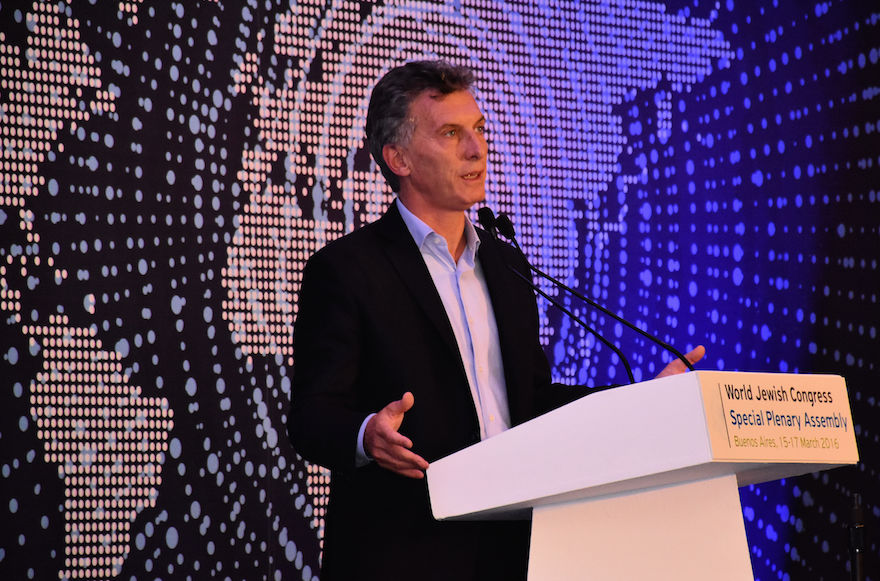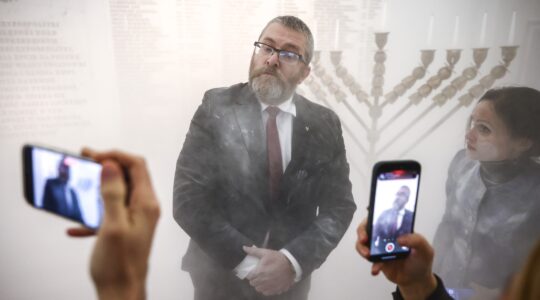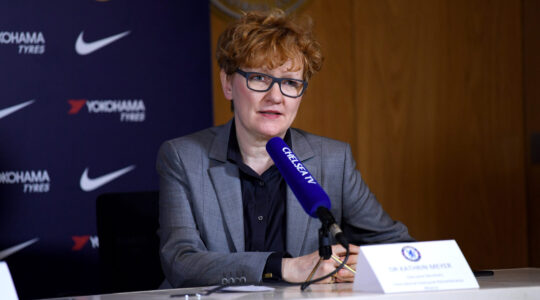
Argentinean President Mauricio Macri addressing delegates of the World Jewish Congress in Buenos Aires, March 15, 2016. (World Jewish Congress)
BUENOS AIRES (JTA) — Israeli Prime Minister Benjamin Netanyahu was declared an honored visitor by the Buenos Aires city legislature.
The honor will be bestowed on him on September 12 while he is in Buenos Aires, at the empty town square that marks the place where the Israeli embassy was located until it was destroyed in a car bomb attack in March 1992, which killed 29 people. Netanyahu also will visit Jewish institutions and will honor the victims of the July 18, 1994 terrorist attack against the AMIA Jewish center that killed 85. Both attacks remain unsolved.
The motion was proposed by legislator Mercedes De las Casas of PRO, the political party led by Argentine President Mauricio Macri.
Netanyahu’s visit to Argentina will be the first by a sitting Israeli prime minister since the creation of the State of Israel in 1948. “This is a gesture of the utmost importance,” read the resolution passed Thursday by the city legislature.
Netanyahu is scheduled to arrive in Argentina’s capital on September 11 with a group of 30 Israeli businessman to meet national government authorities, local Jewry and businessman.
He will spend his visit in the capital city Buenos Aires, home of 165,000 Jewish inhabitants, a similar number to the combined Jewish populations in Brazil, Chile, Mexico and Uruguay. The Jewish community of Argentina is the sixth largest in the world after Israel, the United States, France, Canada, and Great Britain, and ahead of Russia.
The Word Jewish Population study of 2016 by Sergio Della Pergola of Hebrew University, counted 180,700 people as members of the Argentine Jewish community. According the World Jewish Congress, the Jewish population in Argentina is 230, 000.
“My visit to Argentina is an Israeli priority,” Netanyahu told World Jewish Congress leaders in Jerusalem in September 2016. “I have received many invitations to visit different countries. However, the visit to Argentina is a priority,” he added.
In January 2016, Marci met Netanyahu at the Global Economic Forum in Davos, Switzerland. Netanyahu praised Macri’s moves to strengthen Argentine-Israeli relations. “Macri told me unequivocally: ‘We are starting a new slate with Israel. Our interests and values make this partnership necessary and therefore we are beginning a new era,’” Netanyahu said at the start of a Cabinet meeting on following their encounter.
“Netanyahu’s visit to Argentina is undoubtedly a milestone in bilateral ties. Since the establishment of diplomatic relations and the opening of an Argentine embassy in Tel Aviv in 1949 during the Juan Perón administration relations have developed in all areas and all fields. These ties, for Argentina, had to do with the importance of the Jewish community in the social fabric of the country, as well as geopolitical considerations,” Ranaan Rein, vice president of Tel Aviv University and a member of Argentina’s National Academy of History, told JTA.
“For Israel, it had to do with the important Jewish diaspora of Argentina, the need for political support in Latin America, and at times with commercial issues. Argentine-Israeli relations have been profound enough to survive all political upheavals taking place in both countries during the past 70 years. It is unfortunate, however, that the first Israeli prime minister to visit Argentina is at the moment involved in corruption scandals and his political future is uncertain,” Rein added.
Israeli ties with Argentina have improved considerably since Macri won the presidency in 2015. The friendly signs from the current Argentinean president to Israel started before Macri was elected president. In June 2014 as Buenos Aires city mayor he traveled to Israel and condemned the kidnapping by Palestinian men of three Israeli youths in the West Bank who were later found dead.
When Macri won the elections, in November 2015, Netanyahu called to congratulate him on his victory. “Macri told me that relations between Argentina and Israel will now change for the better,” Netanyahu wrote in a post on Facebook.
Israel was among the critics of the memorandum of understanding that Argentina signed with Iran in January 2013 to jointly investigate the AMIA 1994 Jewish center bombing attack. In his first week in office Macri voided it.
“This is a welcome change of direction, and I hope we will see a significant improvement of Argentina-Israeli relations as well as a change for the better in relations with other countries in South America in the coming years,” Netanyahu said at the time.
Macri met with the Israeli survivors and relatives of victims of the 1992 terrorist attack against the Israeli Embassy in Buenos Aires in 2017, marking the first time that an Argentinean president met with Israeli survivors.
Two Israeli president visited Argentina: Shimon Peres in 2009 and Chaim Herzog 1989.
Following his visit to Argentina through September 13, Netanyahu will travel north to Colombia for a few hours and then to México. Netanyahu then will arrive in New York to speak at the United Nations General Assembly on September 19.
JTA has documented Jewish history in real-time for over a century. Keep our journalism strong by joining us in supporting independent, award-winning reporting.





